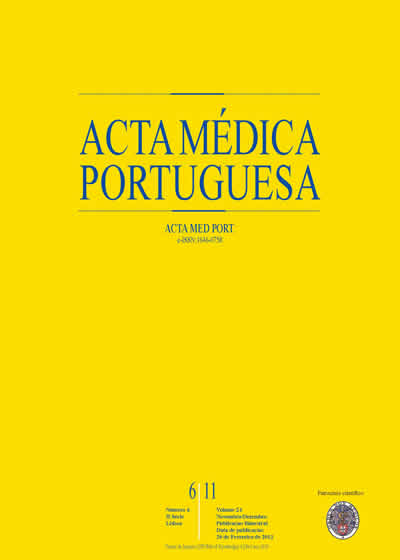Factores de risco para a progressão da ingestão alimentares por via oral de doentes com doenças neurológicas degenerativas em acompanhamento em terapia de fala.
DOI:
https://doi.org/10.20344/amp.1424Resumo
Currently studying the speech voice therapy effectiveness in cases of oropharyngeal dysphagia has been deepened and included the variables that prevent the patient develops treatment.To study the possible risk factors for progression of food intake by mouth during the speech accompanying dysphagia in patients hospitalized with degenerative neurological diseases.Retrospective study conducted at the Department of Speech Therapy in a General Hospital from January 2007 to May 2008. Were collected 117 records of patients with oropharyngeal dysphagia, and only 15 (12.8%) were diagnosed with degenerative neurological disease, evolved with complaints of dysphagia and underwent speech therapy. We used myofunctional orofacial and vocal exercises for rehabilitation. We applied Fisher's exact test and nonparametric test Mann-statistical analysis of possible relationship with risk factors, namely clinical events during therapy and respiratory conditions of patients.Study participants were 11 (73.3%) female patients and four (26.7%) males. Ten (66.7%) patients who progressed on the ability of oral intake and had less time in therapy, 11 (73.4%) did not present any problem, two (13.3%) had worsening of symptoms and two (13.3%) had a lowered level of consciousness during the therapeutic process. Ten of 15 patients (66.7%) showed progression in the ability of oral intake according to clinical assessment (range FOIS®), five (33.3%) remained the same conditions prior to therapy and no patient had worsening oral intake.The level of consciousness and respiratory complications in this study were associated with poor prognosis for the progression of oral in speech therapy.Downloads
Downloads
Publicado
Como Citar
Edição
Secção
Licença
Todos os artigos publicados na AMP são de acesso aberto e cumprem os requisitos das agências de financiamento ou instituições académicas. Relativamente à utilização por terceiros a AMP rege-se pelos termos da licença Creative Commons ‘Atribuição – Uso Não-Comercial – (CC-BY-NC)’.
É da responsabilidade do autor obter permissão para reproduzir figuras, tabelas, etc., de outras publicações. Após a aceitação de um artigo, os autores serão convidados a preencher uma “Declaração de Responsabilidade Autoral e Partilha de Direitos de Autor “(http://www.actamedicaportuguesa.com/info/AMP-NormasPublicacao.pdf) e a “Declaração de Potenciais Conflitos de Interesse” (http://www.icmje.org/conflicts-of-interest) do ICMJE. Será enviado um e-mail ao autor correspondente, confirmando a receção do manuscrito.
Após a publicação, os autores ficam autorizados a disponibilizar os seus artigos em repositórios das suas instituições de origem, desde que mencionem sempre onde foram publicados e de acordo com a licença Creative Commons









